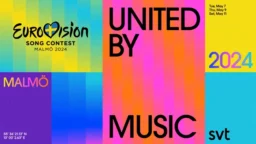It’s early February and the Slovenian band Joker Out presents their Eurovision entry on television: Carpe Diem, ‘Seize the day’. The energy and joy are palpable from Bojan (24), Kris (23), Jan (24), Jure (26), and Nace (28). What is Carpe Diem about? And why did the Slovenian broadcaster immediately change the planned national final when they found out that the band wanted to go to Liverpool?
Popular and special
Joker Out was formed in 2016 by a group of high school students who had known each other for a long time, who had already been making music together, but from that point on promised each other: we’re going to make this our career. The composition of the group has changed slightly since the beginning, but they still have the same vibe: a group of ambitious young pups who know each other well. A group that, when needed to come up with a name, ended up with ‘Joker Out’. It doesn’t mean anything special, but it sounds popular (the ‘Joker’ part, according to one of the band members) and a bit special (the addition of the word ‘out’).
Posters
After their song Gola, about a great love of frontman Bojan Cvjetićanin, became a huge hit in 2019, many concerts followed. It had been a long time since a Slovenian band had such a breakthrough. The five-member band has now become the star of the Slovenian music scene. In 2022 they were the country’s best-selling artists. On Instagram, fans showed how they baked cakes for the launch of their second album, and a youth magazine gave away posters featuring Harry Styles, Imagine Dragons, Freddy Mercury – and two different ones of Joker Out.
Austin Powers
‘Shagadelic‘ is the band’s favourite adjective. They call their music ‘shagadelic rock and roll’. A word they took from an Austin Powers movie they saw as teenagers, impressed by the energy of the main character. They wanted to translate that energy into music. The word is a reminder to make sexy, spontaneous, frivolous music, even now when they sometimes seem to have become a ‘well-oiled business machine’, according to Bojan.
Seize the day
In that respect, the Eurovision song fits the band well. Seize the day: an ode to living in the moment and carefree celebrating the here and now. They all composed the song together – a first for them. Usually, it’s frontman Bojan who writes the songs. This time, they collectively created it, partly at home, partly in the isolation of a modern studio in Hamburg. The music always comes first, the lyrics always follow.
Roman Poem
Where does the expression ‘Carpe diem’ actually come from? It’s Latin and was first written down in antiquity by the Roman poet Horace – who, according to some experts, may also have sung from time to time. At the end of the poem, he makes the following call on the reader:
[…] prune your expectations for the long
term. While we talk, envious time
has already fled:
Seize the day, trust as little as possible in
that of tomorrow.
Jumping over Mountains
More than two thousand years later, Joker Out responds affirmatively to this call:
We won’t count the hours until the dawn arises.
We’ll jump across the mountains.
We’ll accept that we are eternal and happy,
only as long as the sky keeps embracing us.
And at the end of the song:
We danced, loved, and played all night.
We lived as if there was no tomorrow.
810,000 years
But there’s also something contemporary about the song, especially when the reasons for living ‘as if there will never be a tomorrow’ are mentioned. Bojan sings:
Thin ice burning under our feet,
You must only work for 810,000 years to make your soul breathe a little.
You win if you stay alive.
Politics
Is that a critique of the capitalist rat race? Earlier songs by Joker Out often dealt with love. In late 2021, Bojan responded to the question of whether they might become more politically engaged in the future – like many other rock bands – by saying, ‘If more people sang about love, fewer politically engaged songs would be needed to improve the future.’
But that seems to have changed now. Now the band sings:
The game of hatred is your thing, thank you,
Don’t count on us.
Anthem
A dig at conservatism and narrow traditions? A young Slovenian fan called Carpe Diem an anthem of the younger generation. Not in the least because the new generation of Slovenians does not want to conform to traditions and norms set by previous generations. Moreover, the fan added, that specific line ‘don’t count on us’ could be a response to the patriotic song Računajte na nas (‘Count on us’) by the Yugoslavian rock band Rani Mraz, popular among young people in the late seventies, telling President Tito and his communist regime to indeed count on them.
Language
However, the average Eurovision viewer will get little of the song’s content. The band sings in Slovenian. They knew they would do so as soon as they were asked. They express themselves best in this language, this is how their fans got to know them, and this is how they can best convey their energy on stage. But doesn’t it diminish their chances of winning? ‘In that case the whole festival would be pointless,’ says Bojan.
Pixels
Slovenian is like a complicated but satisfying puzzle. Band member Kris says, ‘Slovenian is an extremely demanding and rigid language. If you manage to write something beautiful in that language, it gives you a phenomenal sensation.’ And band member Jan compares Slovenian to a high-resolution photograph. ‘If you translate that into English, you lose valuable pixels.’
Three minutes
Yet they also look beyond the borders of their own country, which they call so small that ‘everyone knows each other too well to dare to undress in a euphoric moment at a concert.’ They once recorded some songs in Serbian, the language of Bojan’s grandmother: ‘She liked the songs, she was just a bit angry that I used a swear word.’ Now it’s time to focus on the rest of Europe. An album with their own repertoire in translation is planned. Carpe diem and the song New wave are already available in English.
But first, Liverpool, with, as they themselves say, a ‘Joker Out concert experience of three minutes. Because we are our own special effects.’
Photo: Urša Premik – Eurovision.tv
Source of Horace poem: https://www.meermansburg.nl/wp-content/uploads/2020/03/Horatius-Carpe-Diem.pdf (Translation by Rudi van der Paardt.)






